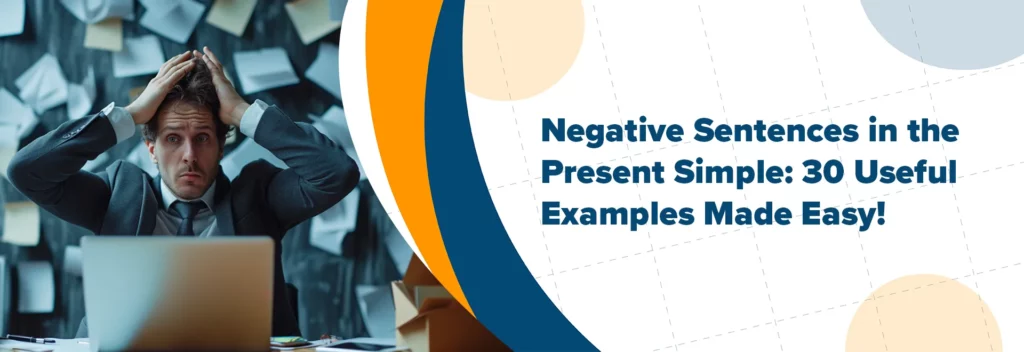
Negative Sentences in the Present Simple: 30 Useful Examples Made Easy!
We all know that the verb is a complex aspect of the English language because it has a lot of features that need to be learned by every language learner. The verb tenses, for example, are one these features and they play a very important role in English grammar.
We have already learned about the tenses in English and how they function in sentences. We have also introduced to you the simple present or present simple tense in English and how they are formed in sentences.
The present simple tense is a fundamental building block of English grammar. It is used to express habits, routines, and general truth. However, what about situations where you want to say something doesn’t happen? That’s where negative sentences in the present simple come in!
This guide will help you have a clear understanding of negative sentences in the present simple tense. We will break down the structure, explore common mistakes that every learner makes, and provide 10 crystal-clear examples to help you in your learning.
Forming Negative Sentences in Present Simple: Statement
The structure of negative sentences in the present simple is:
Subject + don’t/doesn’t + base form of the verb + rest of the sentence
Here’s a breakdown of the components:
Subject: This identifies who or what is performing the action (e.g., any noun or pronoun).
don’t/doesn’t: These are the negative auxiliary verbs.
Base form of the verb: This is the uninflected form of the verb (e.g., work, eat, sleep).
Examples:
I don’t like coffee.
She doesn’t speak French.
The train doesn’t leave until 7 pm.
Note: When constructing negative sentences in the present simple, pay attention to the subject used. The negative auxiliary verbs “don’t and doesn’t” should be used appropriately in sentences.
“Don’t” is used for the pronoun “I, You, We, and They along with plural nouns as subject in the sentence (e.g. The children, Those gentlemen, The ladies, etc). “Doesn’t” is used for pronouns “He, She, and It” as well as with singular nouns as subject (e.g. The girl, The woman, His father, etc.).

Forming Negative Sentences in Present Simple: Questions
The structure of negative sentences in the present simple questions is:
Don’t/doesn’t + Subject + base form of the verb + rest of the sentence
Obviously, when forming a question in negative sentences in the present simple, we start by putting the auxiliary verbs at the beginning of the sentence followed by the subject, the main verb, and the rest of the sentence.
Examples:
Do you not like Mathematics?
Do the children not eat vegetables?
Does he not cook breakfast for you?
Does the manager not give good comments?
Notice that if we contract the auxiliary verb and the word “not,” it follows the auxiliary verb.
Don’t you like Mathematics?
Don’t the children not eat vegetables?
Doesn’t he cook breakfast for you?
Doesn’t the manger give good comments?
It is important to note that the use of the auxiliary verbs must be aligned correctly with the subject in the sentence when forming the negative sentences in the present simple.
Negative Sentences in the Present Simple: with Be-verbs
Aside from the auxiliary verbs, we also form the present simple tense with the help of the be-verbs (am, is, are, was, were) when speaking about general truths such as geographical fact, mathematical fact, historical fact, etc. However, to form a negative sentence in this case, we add “not” after the be-verb.
Examples:
Our house is not beside the river bank.
Mt. Fuji is not the highest mountain in the world.
10+5 is not equal to 105.
To form a question of negative sentences in the present simple with the be-verbs, it’s different from the question formed using the auxiliary verbs “don’t and doesn’t.”
The structure with the be-verbs is:
Be-verb + Subject + not + rest of the sentence
Examples:
Is the Nile not the longest river in the world?
Were the Europeans not the first to discover America?
Are these statues not for the soldiers?
Common Mistakes Most Learners Make
Here are some common mistakes to watch out for when forming negative sentences in the present simple:
- Forgetting the auxiliary verb: Don’t leave out “don’t” or “doesn’t.” It’s crucial to indicate the negative meaning.
- Adding “n’t” to the main verb: This is a common error. Remember, “n’t” goes with the auxiliary verb, not the main verb.
- Putting the third person singular form of the main verb when using “does” (e.g. She doesn’t likes painting.).
- Using the third person singular form when using the be verb “is” especially when contracted (e.g. She isn’t makes me sad.).

30 Crystal-Clear Examples of Negative Sentences in the Present Simple
Don’t/Doesn’t
- I don’t eat breakfast.
- We don’t live in a big city.
- They don’t go to the gym every day.
- He doesn’t understand this concept.
- She doesn’t drink milk.
- It doesn’t rain much in this area.
- The children don’t play outside after dark.
- This bus doesn’t stop at my street.
- My friends don’t like watching horror movies.
- The library doesn’t open on Sundays.
Am/Is/Are/Was/Were
- She told me that I was not beautiful.
- My friends aren’t busy on the weekends.
- He is not as gentleman as his brother.
- We argued that the Buckingham Palace is not the queen’s home.
- The Filipino soldiers were not totally wounded during the Battle of Yultong.
- My mom said that it was not possible for another war to happen.
- I hated Mathematics when I was in High School; it was not my favorite subject.
- The Osaka castle is not empty on the weekends.
- President Obama was not elected twice in the US elections.
- I am not your friend, so please leave me alone.
Questions
- Am I not good at my tasks?
- Is the Amazon River not the deepest river in the world?
- Are Germany and France not allies?
- Doesn’t he want to propose to you on your birthday?
- Isn’t Angelina Jolie one of the most beautiful faces in Hollywood?
- Do the teachers not attend their regular meeting on Fridays?
- Were you not in the bedroom when I called?
- Does the press not give fake news about the assassinated celebrity?
- Was she not in the mood to perform on stage?
- Were the children not informed of the current situation in school?
To perfect making negative sentences in the present simple tense, familiarize the structure and practice these examples. Don’t be afraid to use contractions in your everyday speech. They sound more natural and make your sentences flow better.
Don’t be too hard on yourself!




